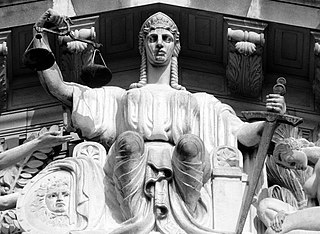
In English law, natural justice is technical terminology for the rule against bias and the right to a fair hearing. While the term natural justice is often retained as a general concept, it has largely been replaced and extended by the general "duty to act fairly".

The doctrine of legitimate expectation was first developed in English law as a ground of judicial review in administrative law to protect a procedural or substantive interest when a public authority rescinds from a representation made to a person. It is based on the principles of natural justice and fairness, and seeks to prevent authorities from abusing power.
Judicial review is a part of UK constitutional law that enables people to challenge the exercise of power, usually by a public body. A person who contends that an exercise of power is unlawful may apply to the Administrative Court for a decision. If the court finds the decision unlawful it may have it set aside (quashed) and possibly award damages. A court may impose an injunction upon the public body.

United Kingdom administrative law is part of UK constitutional law that is designed through judicial review to hold executive power and public bodies accountable under the law. A person can apply to the High Court to challenge a public body's decision if they have a "sufficient interest", within three months of the grounds of the cause of action becoming known. By contrast, claims against public bodies in tort or contract are usually limited by the Limitation Act 1980 to a period of 6 years.
Wednesbury unreasonableness is a ground of judicial review in Singapore administrative law. A governmental decision that is Wednesbury-unreasonable may be quashed by the High Court. This type of unreasonableness of public body decisions was laid down in the English case of Associated Provincial Picture Houses v. Wednesbury Corporation (1947), where it was said that a public authority acts unreasonably when a decision it makes is "so absurd that no sensible person could ever dream that it lay within the powers of the authority".

The doctrine of legitimate expectation in Singapore protects both procedural and substantive rights. In administrative law, a legitimate expectation generally arises when there has been a representation of a certain outcome by the public authorities to an individual. To derogate from the representation may amount to an abuse of power or unfairness. The doctrine of legitimate expectation as a ground to quash decisions of public authorities has been firmly established by the English courts. Thus, where a public authority has made a representation to an individual who would be affected by a decision by the authority, the individual has a legitimate expectation to have his or her views heard before the decision is taken. Alternatively, an individual may also have a legitimate expectation to a substantive right. The recognition of substantive legitimate expectations is somewhat controversial as it requires a balancing of the requirements of fairness against the reasons for any change in the authority's policy. This suggests the adoption of a free-standing proportionality approach, which has been said not to apply in administrative law.

Errors as to precedent facts, sometimes called jurisdictional facts, in Singapore administrative law are errors committed by public authorities concerning facts that must objectively exist or not exist before the authorities have the power to take actions or make decisions under legislation. If an error concerning a precedent fact is made, the statutory power has not been exercised lawfully and may be quashed by the High Court if judicial review is applied for by an aggrieved person. The willingness of the Court to review such errors of fact is an exception to the general rule that the Court only reviews errors of law.

The remedies available in Singapore administrative law are the prerogative orders – the mandatory order, prohibiting order (prohibition), quashing order (certiorari), and order for review of detention – and the declaration, a form of equitable remedy. In Singapore, administrative law is the branch of law that enables a person to challenge an exercise of power by the executive branch of the Government. The challenge is carried out by applying to the High Court for judicial review. The Court's power to review a law or an official act of a government official is part of its supervisory jurisdiction, and at its fullest may involve quashing an action or decision and ordering that it be redone or remade.

Administrative law in Singapore is a branch of public law that is concerned with the control of governmental powers as exercised through its various administrative agencies. Administrative law requires administrators – ministers, civil servants and public authorities – to act fairly, reasonably and in accordance with the law. Singapore administrative law is largely based on English administrative law, which the nation inherited at independence in 1965.

Illegality is one of the three broad headings of judicial review of administrative action in Singapore, the others being irrationality and procedural impropriety. To avoid acting illegally, an administrative body or public authority must correctly understand the law regulating its power to act and to make decisions, and give effect to it.

Re Fong Thin Choo is an administrative law case decided in 1991 by the High Court of Singapore concerning the legality of a demand by the Director-General of Customs and Excise ("DG") that the applicant's company pay S$130,241.30 in customs duty as it had not exported certain goods. The case was presided over by Justice Chan Sek Keong. The Court decided that the DG had failed to take into account relevant evidence adduced by the applicant's company which could have been capable of rebutting the prima facie evidence of non-export, and had thus made an insufficient inquiry before arriving at his decision. Since the DG's demand had been based on an incorrect basis of fact and thus had been made contrary to law, the Court granted the applicant an order of prohibition that barred the DG from deducting the sum from certain bankers' guarantees that the applicant's company had lodged with Customs as security.

Threshold issues are legal requirements in Singapore administrative law that must be satisfied by applicants before their claims for judicial review of acts or decisions of public authorities can be dealt with by the High Court. These include showing that they have standing to bring cases, and that the matters are amenable to judicial review and justiciable by the Court.

The remedies available in a Singapore constitutional claim are the prerogative orders – quashing, prohibiting and mandatory orders, and the order for review of detention – and the declaration. As the Constitution of the Republic of Singapore is the supreme law of Singapore, the High Court can hold any law enacted by Parliament, subsidiary legislation issued by a minister, or rules derived from the common law, as well as acts and decisions of public authorities, that are inconsistent with the Constitution to be void. Mandatory orders have the effect of directing authorities to take certain actions, prohibiting orders forbid them from acting, and quashing orders invalidate their acts or decisions. An order for review of detention is sought to direct a party responsible for detaining a person to produce the detainee before the High Court so that the legality of the detention can be established.

Exclusion of judicial review has been attempted by the Parliament of Singapore to protect the exercise of executive power. Typically, this has been done though the insertion of finality or total ouster clauses into Acts of Parliament, or by wording powers conferred by Acts on decision-makers subjectively. Finality clauses are generally viewed restrictively by courts in the United Kingdom. The courts there have taken the view that such clauses are, subject to some exceptions, not effective in denying or restricting the extent to which the courts are able to exercise judicial review. In contrast, Singapore cases suggest that ouster clauses cannot prevent the High Court from exercising supervisory jurisdiction over the exercise of executive power where authorities have committed jurisdictional errors of law, but are effective against non-jurisdictional errors of law.
The failure of a public authority to take into account relevant considerations and the taking of irrelevant ones into account are grounds of judicial review in Singapore administrative law. They are regarded as forms of illegality.

An ouster clause or privative clause is, in countries with common law legal systems, a clause or provision included in a piece of legislation by a legislative body to exclude judicial review of acts and decisions of the executive by stripping the courts of their supervisory judicial function. According to the doctrine of the separation of powers, one of the important functions of the judiciary is to keep the executive in check by ensuring that its acts comply with the law, including, where applicable, the constitution. Ouster clauses prevent courts from carrying out this function, but may be justified on the ground that they preserve the powers of the executive and promote the finality of its acts and decisions.
Jurisdictional error is a concept in administrative law, particularly in the UK and Australia. Jurisdiction is the "authority to decide", and a jurisdictional error occurs when the extent of that authority is misconceived. Decisions affected by jurisdictional error can be quashed by judicial review. Examples of jurisdictional errors include asking a wrong question, ignoring relevant material, relying on irrelevant material, and breaching natural justice.

R v Central Criminal Court[2014] UKSC 17 was a 2014 judgment of the Supreme Court of the United Kingdom. The court held that as inter partes proceedings created a lis between the parties, equal treatment meant that ex parte evidence in general could not be adduced.

R v SS for Environment, Transport and the Regions [2001] UKHL 23 is a UK constitutional law case, concerning judicial review.

E v Secretary of State for the Home Department was a landmark Court of Appeal case of 2004 which significantly developed the doctrine of error of fact as a distinct ground which was taken in conjunction with the question of new evidence being considered in order to establish the error. The case laid out in definitive terms the criteria for the court to review a finding of mistake of fact leading to unfairness. In establishing an error of fact according to the requirements, a duty was identified to consider a decision; in particular, the duty to reopen a matter or direct a rehearing. The question of new evidence produced after the hearing but before the decision date was considered within the context of the power of the Immigration Appeal Tribunal (IAT) to direct a rehearing.















